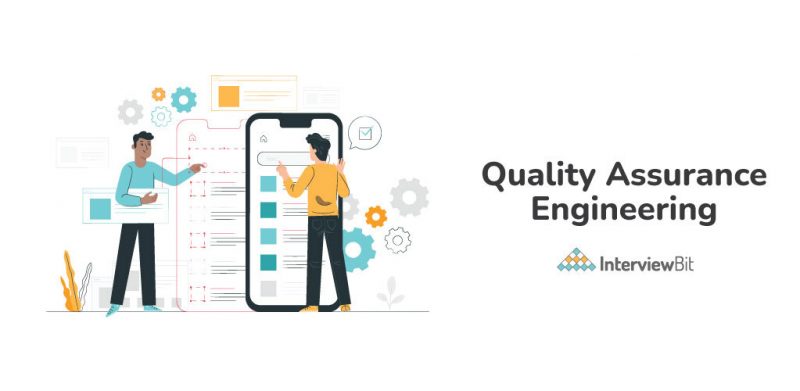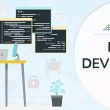Developing effective and high-quality code means testing your code regularly, but how exactly to do that is a challenging question. If you don’t know what you should test and how to test it, you’re bound to end up writing low-quality code. The role of a software tester varies based on the size, structure, and specific needs of the organization. The most commonly used job title for software testers is QA (Quality Assurance). Quality assurance is a discipline that involves monitoring other developers’ work, creating processes and tests to reduce bugs, and ensuring a product meets end-user expectations.
What is QA Engineering?
QA engineering encompasses both primary (functional) and secondary (analytical) elements within the context of system and system integration testing. (can be deleted)
Quality assurance (QA) is a method of avoiding problems when delivering products or services to clients by preventing mistakes and flaws in manufactured products. It refers to the administrative and procedural operations carried out in a quality system to ensure that a product’s, service’s, or activity’s objectives and goals are met. QA engineering encompasses both primary (functional) and secondary (analytical) elements within the context of system and system integration testing.
Confused about your next job?
This definition gives a comprehensive overview of the role, responsibilities, and required skills associated with this crucial activity. When you are designing the product or providing a service for your customer, there are many points to consider. It is more significant to identify whether the goal is to keep the customer happy and continue using your product or generate revenue.
Sometimes, specific changes are needed to expedite the process and help save time for everyone involved. When it comes time to define what QA Engineering is, there are two main criteria you will need to consider. First, this will be your project’s goal. Second, this will be how you measure progress toward this goal.
Who is QA Engineer?

Essentially, a QA (Quality assurance) Engineer is responsible for testing and auditing software and hardware products to ensure they meet stringent quality standards. These individuals are typically employed by large software and hardware companies, educational institutions, and non-profit organizations.
As part of their job duties, a QA engineer may perform multiple tasks. For example, they include performing software vulnerability testing, performing software analysis on hardware components to detect potential security vulnerabilities, writing test cases for new applications and operating systems, maintaining database backups, and estate planning.
What is the demand for this role?
The demand for Quality assurance Engineers (QA) has increased with the continued requirement for software to be multi-functional and to function correctly in the field. The market demand for Quality assurance Engineers (QA) has also increased due to the changing world of technology and its effect on the business, as new technologies become available for every type of industry.
The need for QA engineers has never been greater as companies strive to stay competitive in the highly competitive software development industry by developing cutting-edge products.
QA Engineer Salary
The average base salary for a QA Engineer in India is ₹385,530 per annum. The average salary range can go from a minimum of ₹238k per annum to a maximum of ₹1 Million per annum. The table below gives you a detailed perspective of the salary for a QA Engineer as per the Experience.
With less than a year of experience, an entry-level Quality Assurance (QA) Engineer may expect to make an average total salary of Rs. 241,753 (including tips, bonus, and overtime pay). With 1-4 years of experience, an early career Quality Assurance (QA) Engineer makes an average total remuneration of Rs.361 397.
The typical total income for a mid-career Quality Assurance (QA) Engineer with 5-9 years of experience is Rs.589 574. The average total remuneration for an experienced Quality Assurance (QA) Engineer with 10-19 years of experience is Rs. 728,027. Employees in their late careers (20 years and up) earn an average total salary of Rs.925 000.
| Experience Level | Average Salary PA |
|---|---|
| Entry-level | ₹241,753 |
| Early career | ₹361,397 |
| Mid-career | ₹589,574 |
| Experienced level | ₹10,28,027 |
Salary Based On Location
Here is the salary breakdown of a QA engineer salary based on city.
Bangalore
The average base salary for a QA Engineer in Bangalore is ₹531,184 per annum.
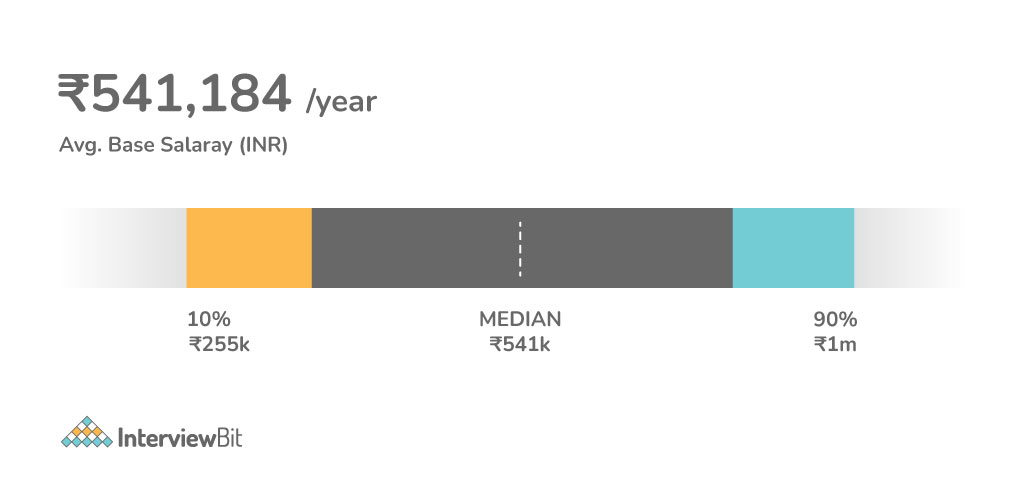
Hyderabad
The average base salary for a QA Engineer in Hyderabad is ₹437,633 per annum.
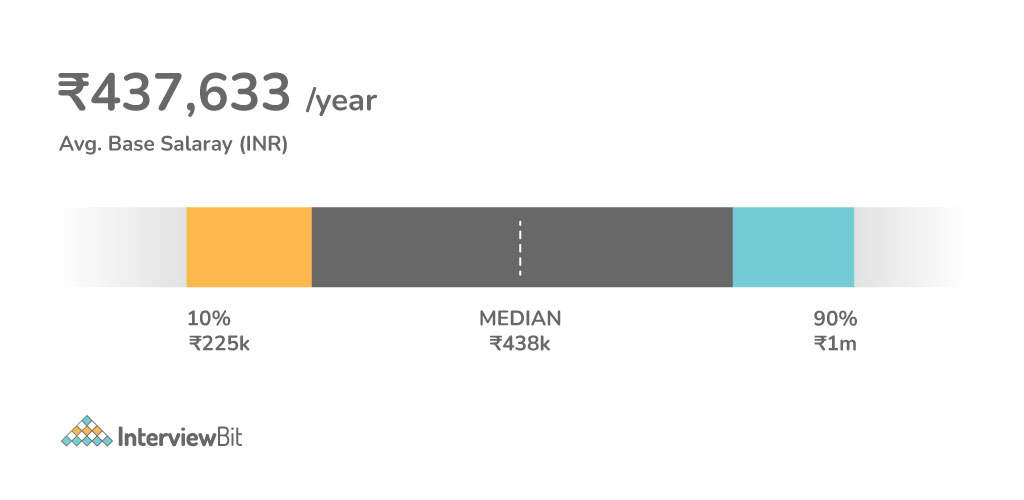
Mumbai
The average base salary for a QA Engineer in Mumbai is ₹307,306 per annum.
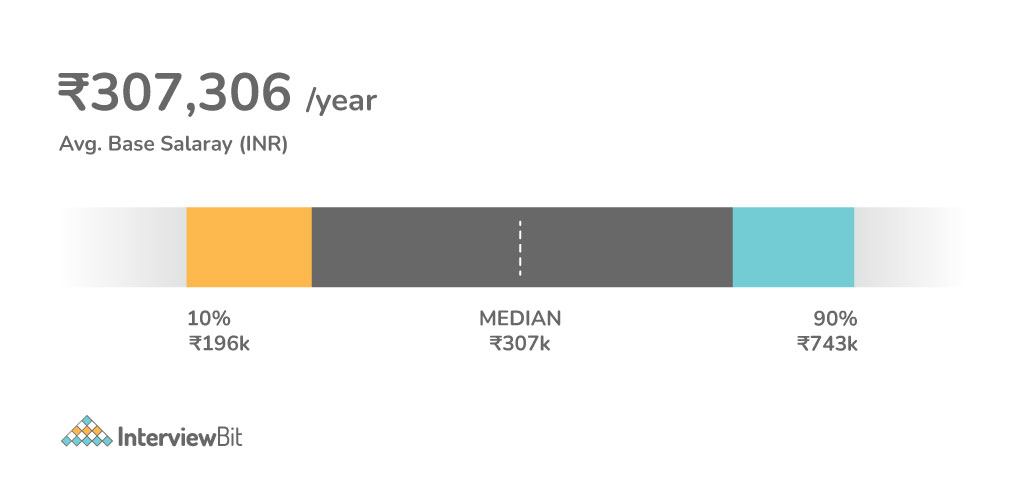
Gurgaon
The average base salary for a QA Engineer in Mumbai is ₹296,609 per annum.
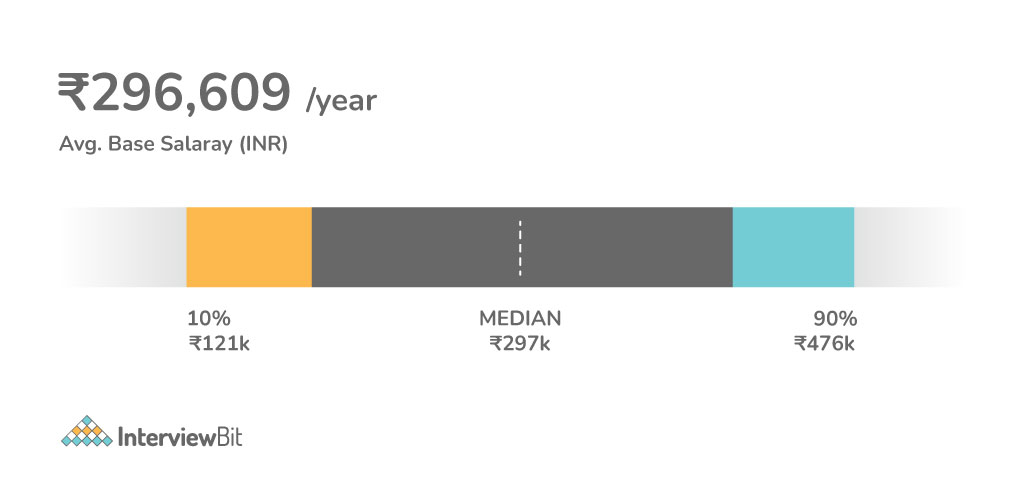
Chennai
The average base salary for a QA Engineer in Mumbai is ₹3,85,138 per annum.
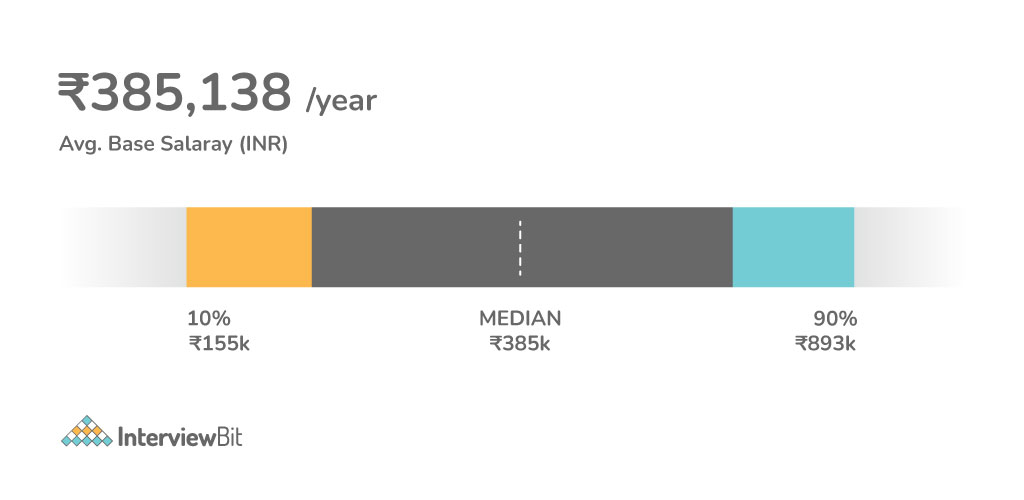
Salary Based On Employer
The Employer wise salary details for a QA Engineer are detailed below in the table –
| Employers | Avg Salary per year |
|---|---|
| HCL Technologies Ltd. | ₹2,53,000/- |
| Flextronics International | ₹2,55,500/- |
| Synerzip | ₹3,50,000/- |
| Tata Consultancy Services Ltd | ₹4,64,516/- |
| Dassault Systems Inc. | ₹5,71,402/- |
| Fidelity Investments | ₹6,82,609/- |
| Oracle Corp. | ₹7,74,194/- |
| Amazon.com Inc. | ₹8,24,000/- |
| Oracle | ₹9,27,119/- |
Amazon.com Inc and Dassault Systems Inc. are among the top respondents for the job title Quality Assurance (QA) Engineer. The highest reported salaries are at Oracle, where the average salary is Rs. 927,119 per annum.
Amazon.com Inc. and Oracle Corp. are two more organizations that pay well for this position, with salaries of roughly Rs. 824,000 and Rs.774, 194 per annum respectively. The lowest-paying company is HCL Technologies Ltd., which pays about Rs.253,000 per annum.
Salary Based On Skills
The salary for a QA Engineer might vary depending on the skills. Table 4 gives the detailed analysis of salary based on different skill sets. Test Automation is the highest-paid job when compared to the others.
| Skill | Salary per year |
|---|---|
| Quality Assurance/Quality Control | ₹3,87,289/- |
| Test Automation | ₹5,41,867/- |
| Internal Audit | ₹3,13,908/- |
| Quality Improvement | ₹3,91,578/- |
| Microsoft Excel | ₹3,02,593/- |
Read More About – QA Engineer Salary
How to Become a QA Engineer?
One of the essential stages in becoming a QA Engineer is closely linked to getting yourself skilled both technically and non-technically. And not just anyone can work as a quality assurance expert.
This position necessitates a diverse set of abilities and technical knowledge. So what abilities do these professionals need to ensure that your project meets your standards and needs, aside from testing experience and knowledge? The following are the most important skills required to become a QA Engineer.
QA Engineer Skills
Technology and engineering, mathematics and science, written and verbal communications, problem-solving, reasoning and logic, and practical skills like exceptional documenting and project management talents are all required for a software quality assurance engineer. In addition, software quality assurance engineers must have the following skills:
- A bachelor’s or associate’s degree is required.
- Working knowledge of software quality assurance approaches, tools, and processes
- SQL and scripting skills are required.
- Work experience in application development and quality assurance is preferred.
- Understanding of multiple Quality assurance tools
- Practical knowledge of a software testing tool (s)
Technical Expertise
To be a software quality assurance engineer, you must first have a solid understanding of the software you’re dealing with, as well as a variety of associated technologies. Then, if you’re ready to work in the industry, you’ll be able to keep up with current events and possess top-tier technical talents like these:
- Proficiency in coding automated tests utilizing UFT/QTP, Katalone, Microsoft Coded UI, Ruby, Cucumber, Watir, Selenium, and other automation tools.
- Knowledge of various software programs (e.g., software package, web apps, windows-based applications, web applications, smartphone apps, and so on.)
- Proficiency in working with various QA/Testing tools and technologies, such as Azure DevOps or TFS, SOAP UI, HP ALM, JIRA, and other similar tools and technologies.
- Make a test plan
- Mastering SQL Scripts and the ability to develop SQL to operate with a variety of databases is required.
- Establish standards and procedures for determining product quality and readiness for release
- Identifying Software Bugs
- Boost innovation while streamlining the testing process as a whole.
- Agile Development Process Experience
- Working Knowledge of Web-Based Testing Applications
- Analyze, classify, and report flaws throughout the testing process.
- Recognize potential issues.
- Users may have to perform manual and automated testing, research and analyze product features that are being tested, and learn about new tools, technologies, and testing processes.
- Examine Interface Design for Reliability and Usability
- Detailed knowledge of QA modules
- Comprehensive knowledge of the software development life cycle
Knowing how the software works aren’t enough. You must be a creative, intelligent, and sensible thinker to figure out what’s wrong when something doesn’t function.
One needs to understand and practice soft skills that most employers expect. The soft skills required are as follows:
Ability to analyze
Some people are naturally better at certain forms of thinking than others, but one can increase their analytical skills with practice. The skills that need to be improved are:
- Thinking Analytically
- Problem-solving ability
- Adaptability to New Technologies
- Examine the Testing Results
Communication Soft skills
Communication plays a major role in defining one’s personality. You should have strong verbal and written communication to become recruited by a good company.
The QA Engineer should have the following skills to excel in their career:
- Excellent communication skills, both verbal and written
- Use both technical and non-technical resources to communicate.
- Test Cases should be documented.
- Conduct and record a risk assessment.
- Keep track of your test progress and outcomes.
- Ability to work under strict deadlines and possess good time management skills.
Work Well As Part Of A-Team
You may or may not be your company’s single software quality assurance engineer, but you’ll be collaborating with other engineers, product managers, developers, and department heads. You’ll need to know their aims and objectives. In some circumstances, you’ll need to explain problems, required solutions, and revised timetables to people who have no prior experience with the software. The skills required are:
- Highly flexible
- Take an initiative of your own
- Persistent and proactive
- Collaborate closely with the product and development teams
QA Engineer Job Description
A Quality assurance Engineer should be in charge of developing and implementing quality coordination and testing strategy and recommending solutions to quality issues that arise. Within specific projects, QA specialists should also play a variety of tasks. The following are the four main roles a QA Engineer should perform:
- Static testing of requirements is performed by a Test Analyst, who ensures that the products are comprehensive and accurate.
- Test Designer develops a collection of tests needed for the project and organizes the appropriate settings for testing.
- Test Executor runs pre-planned tests, documents and describes the defects identified, as well as the methods to reproduce (or fix) them.
- The Test Manager organizes and oversees testing duties such as meeting deadlines, sticking to a schedule, controlling test requirements, assigning jobs to team members, and interacting with stakeholders.
- To satisfy quality requirements, QA Engineer should monitor all stages of software development to discover and rectify system issues.
Roles and Responsibilities of a QA Engineer
- Establish procedures and standards for developers to follow.
- Run both automated and manual test scripts.
- Implement tests to find software issues.
- Examine any bugs or mistakes discovered during the testing process.
- Test findings should be documented for the software development team.
- Propose software enhancements to better user experience.
- Encourage the application development to be more efficient and productive.
- Collaborates with the software developers to help enhance applications.
- Maintain an up-to-date understanding of industry developments and trends.
- Investigate the root causes of non-conforming software and instruct users how to fix it.
- Keep track of quality assurance metrics, including defect density and the number of open defects.
- To keep track of developments in testing tools and methodologies.
- Assess test results to predict user behavior, identify errors/bugs and suggest solutions.
- Ensure timely project delivery by working closely with the product development and testing teams.
Requirements
- A bachelor’s degree in computer science or similar expertise is required.
- Excellent research and reasoning abilities; ability to build and implement all scenarios in the software’s workflow.
- Excellent communication skills
- Good knowledge of the topics like CP/IP, 3-way handshake, DNS, and other networking principles, HTTP (Hypertext Transfer Protocol) (Structure, status codes, authentication, etc.), Protocols of SSL/TLS, Detailed knowledge of Java, Python, SQL, C++, and XML, etc.
Who Hire QA Engineer?
Quality Assurance has become one of the most significant and necessary aspects of the IT industry. The main reason for this is that clients all around the world require flawlessly tested software or applications. Before submissions, all of the industry leaders desire a well-tested and activated product.
As a result, it becomes the developer’s primary worry to complete all types of QA work like tests and assurance checking, deleting any faults and bugs from the specific programming code before final submission. Like any other prospective work opportunity, QA has a lot of growth potential in terms of job opportunities and industry demands. The top recruiters for QA Engineers are:
- Tata Consultancy Services
- Cisco systems
- Apple
- Fidelity Investments
- Workday
- IBM
- Cognizant Technology Solutions
- Amazon
- SAP
- HCL Technologies Ltd
- Oracle Corp. etc.
QA Engineer Resume

However, getting a job without a QA engineer resume summarising those qualifications is nearly complicated for the most qualified people. Even when they are small, most organizations that hire QA engineers use technology to automate their hiring process.
As a result, it’s critical to balance how you say things and employ the correct keywords to capture the recruiter’s attention. Creativity, critical thinking, technical, communication, and project management skills are some of the qualities you may want to incorporate. QA engineers are more realistic in their approach to work and may prefer to seek assistance in selecting the appropriate terms. The resume of a QA Engineer should contain the following:
The header section should start with a professional summary like this:
Software Quality Assurance Engineer with extensive experience and knowledge in a variety of business software environments. Instructor and presenter of tough and complex content to a variety of professional and non-professional groups. Ability to work well both independently and as part of a team.
The next section should contain the qualification, certification courses underwent, List of software known, Internship program attended, projects carried out, etc.
Qualification:
Bachelor’s degree in Computer Science & Engineering
Exceptional Knowledge in VB.NET, DHTML, JAVA, C#, SQL, SSH, XML, Ruby, and Perl
SQL Certification etc.
The next section should describe the experience and the roles and responsibilities handled.
Experience:
Company Name: XX Software Ltd.(From this date to this date)
Designation: Quality Assurance Engineer
Projects Handled:
Roles & Responsibilities carried out:
Assisting development teams with the creation of effective test plans.
Updated current and new automated test suites and infrastructures under strict supervision. Etc.
In the last section, personal details should be included.
How to Prepare for QA Engineer Interviews?
QA interviews often take quite some time, whether for QA testers, analysts, managers, or leads. There will most likely be multiple rounds of interviews. The interviewer will most likely be interested in two things: your skills as a QA professional, knowledge of automation tools, technical expertise, soft skills, and your testing approach. No two firms test goods in the same way; thus, as a QA, it’s critical to be open to new testing methods and approaches. Here are some tips for interview preparation.
Make a habit of recording details about each assignment as you complete it
It is nothing but a project worksheet. It should contain the project’s name, time, your role, the outcome of the project, achievements, if any, test information, tools used, details of the software developed, tactics involved in implementation, client details, etc.
Add retrospective notes
Once you have completed the project details, you need to grow through once and think about adding some information regarding what challenges you faced during the project; what went well with that approach? Or what didn’t work well on that particular task, etc.?
Be prepared with the questions
- A software tester may be asked one of the following five sorts of questions:
- Questions related to projects handled so far
- Questions related to your testing strategy
- Questions related to the various tools you used
- Questions about your role and responsibility in the team
- Questions related to your knowledge
Experiment with being interviewed.
You prepare a set of questionnaires, and with the help of your friends or colleagues, you can practice a mock interview. Also, try to practice and read previous interview experiences of the company.
Frequently Asked Questions
Q: Does QA engineer code?
Yes, a basic understanding of the coding is required for handling automation tools and for documentation.
Q: How hard is QA testing?
It’s not hard. If you have the required skills and experience, it is always easy.
Q: Is QA a dead-end job?
If you are not interested in app development and want to work in the IT industry, it will be easier for you to work as a QA manual tester than as a developer. However, manual QA testing is a disappearing profession. Automation is gaining traction, and it’s only a matter of time before it completely replaces manual testing.
Q: Which is better, QA or developer?
Both are equally good. A developer needs to write codes for software development, whereas QA tests the feasibility of the developed software.
Q: What is needed for a QA engineer?
A Software quality assurance engineer must have the following skills:
- An associate’s or bachelor’s degree is required.
- Knowledge of quality assurance processes, tools, and approaches.
- Scripting and SQL skills are required.
- Knowledge of several quality assurance tools.
- Having practical experience with software testing tools.







 Join WhatsApp Group
Join WhatsApp Group
